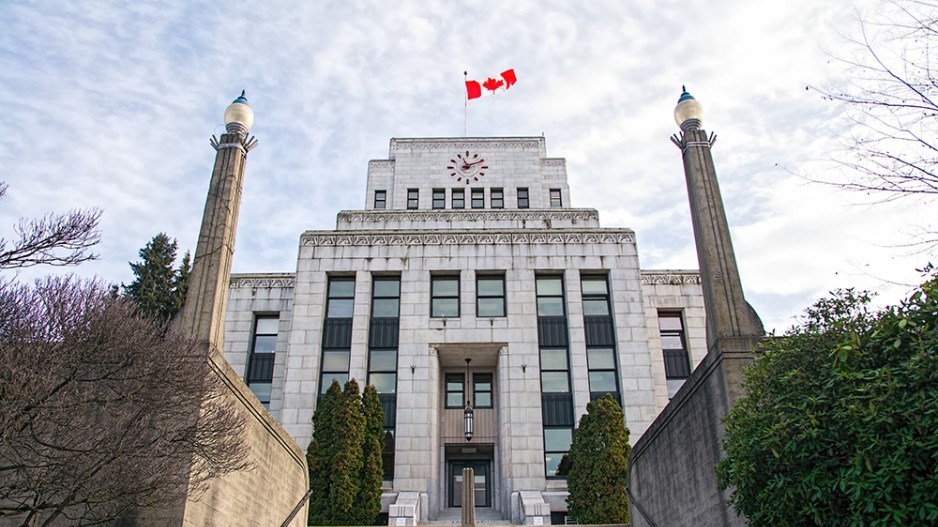Suzie Mah of COPE became the first Vancouver election candidate to win after using a name in Chinese characters on the ballot.
Oct. 15 was otherwise a dismal night for the rest of those who fought the City of Vancouver’s court challenge a month earlier.
Mah, a school teacher and union activist, finished seventh with 42,379 votes for one of nine seats on school board.
Mah and 14 other candidates were allowed to also use names in non-Latin characters or script after a Provincial Court judge decided Sept. 16 to adjourn city hall’s application indefinitely. Chief election officer Rosemary Hagiwara challenged the use of names in Chinese, Vietnamese and Farsi on the ballot, but Senior Judge James Wingham ruled the city’s statutory 72-hour appeal period infringed on his judicial independence and the rights to a fair hearing for the 15 candidates. He decided that the application should be heard sometime after the election.
In a statement in September, Mah reacted with “shock and disbelief” to the city’s application to the court. She said she was given a Chinese name by her parents that is commonly used by her family and Chinese media.
The lawyer for Forward Together city council candidate Tesicca Truong, and Vision Vancouver school board incumbent Allan Wong and city council candidate Honieh Barzegari accused nine of the 10 NPA candidates of a gimmick.
“To say that someone who is not not usually known by a Chinese name, can invent a Chinese name and put it on the ballot as part of their campaign marketing strategy, that’s not appropriate,” Susanna Quail said in court.
As a marketing strategy, it flopped.
Fifth place mayoral candidate Fred Harding of the NPA, who lives in Beijing and is married to a Chinese singer, saw his popular vote decrease 31% in 2022, with 3,905 votes compared with 5,640 four years earlier when he ran with the lesser-known Vancouver 1st.
Ironically, Harding referred to himself as “Fred” in an otherwise Mandarin promotional video shot at a Virani Real Estate Advisors’ Beijing showroom for Vancouver condo sales.
The Chinese characters also didn’t help NPA incumbent Melissa De Genova, who failed to get a third term on city council with 26,578 votes at 19th place. She lost 50% of her support from 2018, when she won a seat with 53,251 votes.
NPA city council candidate Morning Lee came nowhere near being elected with 14,083 votes at 34th place after using characters that correspond to his birth name, Li Huimin. But he saw a 12% increase from 12,614 in 2018 when he was on the Coalition Vancouver slate and known as Morning Li.
Lee remained an NPA candidate despite controversies over his YouTube real estate channels, which contained advice to landlords on how to evict tenants and a so-called Chinese blessing video featuring potentially exploited African children. B.C. Financial Services Authority would not confirm or deny whether it is investigating.
None of the candidates in the 2017 city council by-election used a name in another language and only in two previous elections did candidates list a non-Latin alphabet name on the ballot. In 2014, Audrey Siegl of COPE included an Indigenous name and garnered 19,258 votes. In 2018, Brandon Yan of OneCity had Chinese characters beside his name, but also lost, with 36,167 votes.
The NPA was inspired to add Chinese characters to nomination papers when, on the eve of the registration deadline, a campaign worker questioned why OneCity council candidate Iona Bonamis was allowed to register with Chinese characters.
City hall transportation planner Bonamis, who used characters that translate to her maiden name, Tao Sie Wing, received 33,745 votes for 12th place. But Green Coun. Pete Fry won the 10th and last available seat on council with 37,270 votes.
The biggest winner of the night was ABC Vancouver leader Ken Sim won the mayoralty with a record 85,732 votes. He didn’t need Chinese characters on the ballot. But it probably helped that his signs included Chinese characters that translate to Shen Guanjian.
Vancouver appears to be an outlier, because senior governments do not allow names in other alphabets or scripts on election ballots.
Matthew McKenna of Elections Canada said by email: “Currently, we can only print ballots with information in both English and French, as they are Canada's official languages.”
Andrew Watson of Elections B.C. said the Election Act requires candidate names for provincial elections be shown on ballots in the Roman alphabet.
“Other types of characters such as Chinese or Arabic characters are not permitted. The use of Roman characters allows candidate names to be sorted alphabetically by surname, which is a requirement of the Act,” Watson said.



